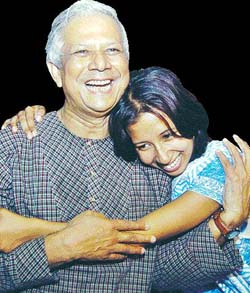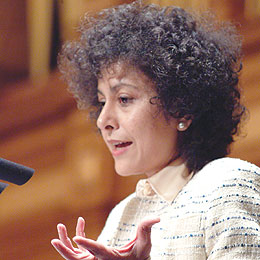
‘The problem lies in the unwillingness to recognize that your own terrorism is terrorism'
Noam Chomsky interviewed by Saad Sayeed
Excalibur Online, October 25, 2006
Known in academic circles for his contribution to the field of linguistics, MIT professor Noam Chomsky is widely recognized as one of the most influential political dissidents of our time. In this interview, Chomsky talks about the roots of terrorism and the role of the intellectual in society.
"The problem lies in the unwillingness to recognise that your own terrorism is terrorism"
Excalibur (Ex): How important is an understanding of the role of states such as the U.S. and the U.K. when examining the question of terrorism?
Chomsky (Ch): It depends on whether we want to be honest and truthful or whether we want to just serve state power ( . . . ) We should look at all forms of terrorism.
I have been writing on terrorism for 25 years, ever since the Reagan administration came in 1981 and declared that the leading focus of its foreign policy was going to be a war on terror. A war against state directed terrorism which they called the plague of the modern world because of their barbarism and so on. That was the centre of their foreign policy and ever since I have been writing about terrorism.
But what I write causes extreme anger for the very simple reason that I use the U.S. government's official definition of terrorism from the official U.S. code of laws. If you use that definition, it follows very quickly that the U.S. is the leading terrorist state and a major sponsor of terrorism and since that conclusion is unacceptable, it arouses furious anger. But the problem lies in the unwillingness to recognize that your own terrorism is terrorism. This is not just true of the United States, it's true quite generally. Terrorism is something that they do to us. In both cases, it's terrorism and we have to get over that if we're serious about the question.
Ex: In 1979, Russia invades Afghanistan. The U.S. uses the Ziaul Haq regime in Pakistan to fund the rise of militancy. This gives Zia a green light to fund cross-border terrorism in Kashmir. Now we allegedly have some of those elements setting off bombs in Mumbai. Clearly, these groups are no longer controlled by any government.
Ch: The jihadi movements in their modern form go back before Afghanistan. They were formed primarily in Egypt in the 1970s. Those are the roots of the jihadi movement, the intellectual roots and the activist roots and the terrorism too.
But when the Russians invaded Afghanistan, the Regan administration saw it as an opportunity to pursue their Cold War aims. So they did with the intense cooperation of Pakistan and Saudi Arabia and others ( . . . ) so the Reagan administration organized the most radical Islamic extremists it could find anywhere in the world and brought them to Afghanistan to train them, arm them.
Meanwhile, the U.S. supported Ziaul Haq as he was turning Pakistan into a country full of madrassahs and fundamentalists. The Reagan administration even ( . . . ) kept certifying to Congress that Pakistan was not developing nuclear weapons, which of course they were, so that U.S. aid to Pakistan could continue. The end result of these U.S. programs was to seriously harm Pakistan and also to create the international jihadi movement, of which Osama bin Laden is a product. The jihadi movement then spread ( . . . ) they may not like it much but they created it. And now, as you say, it's in Kashmir.
Kashmir, though, is a much more complex story. There are plenty of problems in Kashmir and they go way back, but the major current conflicts come from the 1980s. In 1986, when India blocked the election, it actually stole the election, and that led to an uprising and terrorist violence and atrocities, including atrocities committed by the Indian army.
Ex: The colonial legacy is generally dismissed by the media. What role does this legacy play in the emergence of home-grown terrorists in countries such as the U.S., the U.K. and Canada as well as to the creation of terrorism as a whole?
Ch: It's not brought up in the West because it's inconvenient to think about your own crimes. Just look at the major conflicts going on around the world today, in Africa, the Middle East, in South Asia, most of them are residues of colonial systems.
Colonial systems imposed and created artificial states that had nothing to do with the needs and concerns and relations of the populations involved. They were created in the interests of colonial powers and as old fashioned colonialism turned into modern neo-colonialism, a lot of these conflicts erupted into violence and those are a lot of the atrocities happening in the world today.
How can anyone say colonialism isn't relevant? Of course it is and it's even more directly relevant.
Take the London bombing in 2005. Blair tried to pretend that it had nothing to do with Britain's participation in the invasion of Iraq. That's completely ridiculous. The British intelligence and the reports of the people connected in the bombing, they said that the British participation in the invasion and resulting horrors in Iraq inflamed them and they wanted to do something in reaction.
Ex: What is the role of the intellectual when dealing with imperialism and are the intellectuals doing they job?
Ch: Unfortunately, intellectuals are doing their historic job. The historic role of intellectuals if you look, unfortunately, as far back as you go has been to support power systems and to justify their atrocities. So the article you read in the National Post for the production of vulgar Stalinist connoisseurs, that's what intellectuals usually do as far back as you go.
If you go back to the Bible, there's a category of people who were called prophets, a translation of an obscure word, they were intellectuals, they were what we would call dissident intellectuals; criticising the evil king, giving geopolitical analysis, calling for the moral treatment of orphans, decent behaviour. They were dissident intellectuals. Were they treated well? They were prisoned and driven into the dessert and so on, they were the fringe. The people who were treated well were the ones who centuries later, like in the gospel, were called false prophets. So it goes through history. The actual role of the intellectual has been supportive of power.
Should they do that? Of course not; they should be searching for truth, they should be honest, they should be supporting freedom and justice and there are some who do it. There is a fringe who do it, but they're not treated well. They are performing the task that intellectuals ought to perform.
Ex: And what keeps you motivated?
Ch: I'll just tell you a brief story. I was in Beirut a couple of months ago giving talks at the American university in the city. After a talk, people come up and they want to talk privately or have books signed.
Here I was giving a talk in a downtown theatre, a large group of people were around and a young woman came up to me, in her mid-'20s, and just said this sentence: "I am Kinda" and practically collapsed. You wouldn't know who Kinda is but that's because we live in societies where the truth is kept hidden. I knew who she was. She had a book of mine open to a page on which I had quoted a letter of hers that she wrote when she was seven years old.
It was right after the U.S. bombing of Libya, her family was then living in Libya, and she wrote a letter which was found by a journalist friend of mine who tried to get it published in the United States but couldn't because no one would publish it. He then gave it to me, I published it. The letter said something like this:
"Dear Mr Reagan, I am seven years old. I want to know why you killed my little sister and my friend and my rag doll. Is it because we are Palestinians? Kinda". That's one of the most moving letters I have ever seen and when she walked up to me and said I am Kinda, and, like I say, actually fell over, not only because of the event but because of what it means.
Here's the United States with no pretext at all, bombing another country, killing and destroying, and nobody wants to know what a little seven-year-old girl wrote about the atrocities. That's the kind of thing that keeps me motivated and ought to keep everybody motivated. And you can multiply that by 10,000.

